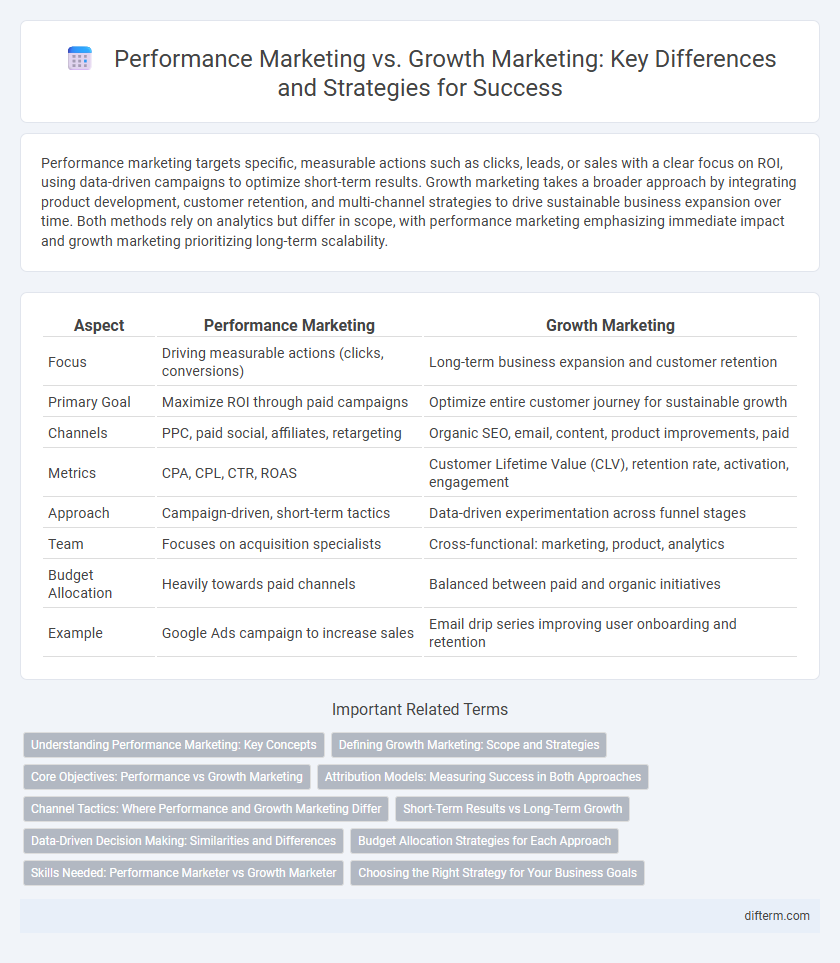Performance marketing targets specific, measurable actions such as clicks, leads, or sales with a clear focus on ROI, using data-driven campaigns to optimize short-term results. Growth marketing takes a broader approach by integrating product development, customer retention, and multi-channel strategies to drive sustainable business expansion over time. Both methods rely on analytics but differ in scope, with performance marketing emphasizing immediate impact and growth marketing prioritizing long-term scalability.
Table of Comparison
| Aspect | Performance Marketing | Growth Marketing |
|---|---|---|
| Focus | Driving measurable actions (clicks, conversions) | Long-term business expansion and customer retention |
| Primary Goal | Maximize ROI through paid campaigns | Optimize entire customer journey for sustainable growth |
| Channels | PPC, paid social, affiliates, retargeting | Organic SEO, email, content, product improvements, paid |
| Metrics | CPA, CPL, CTR, ROAS | Customer Lifetime Value (CLV), retention rate, activation, engagement |
| Approach | Campaign-driven, short-term tactics | Data-driven experimentation across funnel stages |
| Team | Focuses on acquisition specialists | Cross-functional: marketing, product, analytics |
| Budget Allocation | Heavily towards paid channels | Balanced between paid and organic initiatives |
| Example | Google Ads campaign to increase sales | Email drip series improving user onboarding and retention |
Understanding Performance Marketing: Key Concepts
Performance marketing centers on measurable outcomes like clicks, conversions, and ROI, utilizing data-driven strategies to optimize campaigns in real time. Key concepts include pay-per-click (PPC), cost-per-acquisition (CPA), and conversion rate optimization (CRO), which ensure budget efficiency and accountability. This approach contrasts with broader growth marketing by emphasizing immediate, quantifiable results tied directly to advertising spend.
Defining Growth Marketing: Scope and Strategies
Growth marketing encompasses a broader scope than performance marketing by integrating data-driven strategies with long-term customer retention and brand loyalty initiatives. Core tactics include multi-channel experimentation, conversion rate optimization, and lifecycle marketing designed to boost sustainable revenue growth. Emphasizing cross-functional collaboration, growth marketing aligns product development, user experience, and marketing efforts to maximize lifetime value and scalable business expansion.
Core Objectives: Performance vs Growth Marketing
Performance marketing centers on achieving measurable results such as clicks, conversions, and return on ad spend (ROAS) within a specific timeframe. Growth marketing emphasizes sustainable business expansion through experimentation, customer retention, and multi-channel strategies to increase lifetime value (LTV) and market share. While performance marketing targets immediate ROI, growth marketing focuses on long-term scalable growth and brand development.
Attribution Models: Measuring Success in Both Approaches
Performance marketing relies on precise attribution models like last-click and multi-touch to directly measure ROI through specific campaigns, emphasizing immediate conversions. Growth marketing adopts a broader attribution approach, integrating cross-channel data and long-term customer engagement metrics to assess overall business scalability. Both strategies utilize attribution models to optimize marketing spend, but growth marketing focuses on lifetime value while performance marketing targets short-term performance indicators.
Channel Tactics: Where Performance and Growth Marketing Differ
Performance marketing concentrates on channel tactics that drive immediate, measurable actions such as clicks, conversions, and sales through paid advertising and retargeting strategies. Growth marketing employs a broader mix of channels including content marketing, SEO, email campaigns, and viral loops to optimize the entire customer lifecycle and foster sustainable long-term growth. While performance marketing optimizes channels for short-term ROI, growth marketing integrates cross-channel tactics to scale acquisition, retention, and engagement simultaneously.
Short-Term Results vs Long-Term Growth
Performance marketing targets measurable, short-term outcomes through paid campaigns, driving immediate conversions and quick ROI by leveraging data analytics and real-time optimization. Growth marketing emphasizes sustainable, long-term expansion by integrating customer retention, brand building, and multichannel strategies to foster continuous user engagement and lifetime value. Balancing performance marketing's immediate impact with growth marketing's strategic focus ensures both rapid results and enduring business scalability.
Data-Driven Decision Making: Similarities and Differences
Performance marketing and growth marketing both rely heavily on data-driven decision making, using metrics such as customer acquisition cost (CAC), return on ad spend (ROAS), and lifetime value (LTV) to optimize campaigns. Performance marketing typically emphasizes short-term, measurable outcomes aligned with paid advertising channels, while growth marketing adopts a broader approach incorporating experimentation across the entire funnel, including product and retention metrics. The key difference lies in growth marketing's integration of qualitative data and cross-functional insights to fuel sustainable scalability beyond immediate performance indicators.
Budget Allocation Strategies for Each Approach
Performance marketing typically allocates budget towards direct-response campaigns with measurable ROI, prioritizing channels like paid search, social media ads, and affiliate marketing to drive immediate conversions. Growth marketing employs a more diverse budget strategy, investing in long-term initiatives including content creation, SEO, viral marketing, and product optimization to foster sustainable user acquisition and retention. Optimizing budget allocation involves balancing short-term performance-driven spend with growth-driven experiments to maximize overall marketing impact.
Skills Needed: Performance Marketer vs Growth Marketer
Performance marketers excel in data analysis, paid media management, and conversion rate optimization to drive immediate, measurable results. Growth marketers possess a broader skill set including product marketing, user experience optimization, and multichannel experimentation to fuel long-term scalable growth. Mastery of analytics tools and A/B testing is essential for both, but growth marketers also require strategic thinking and cross-functional collaboration skills.
Choosing the Right Strategy for Your Business Goals
Performance marketing emphasizes measurable outcomes and direct ROI through paid advertising channels, ideal for businesses seeking immediate sales and clear attribution. Growth marketing integrates broader tactics, combining data-driven experimentation with customer lifecycle optimization to foster long-term expansion and brand loyalty. Selecting the right strategy depends on your business goals: opt for performance marketing to drive rapid conversions, or growth marketing to build sustainable, scalable growth.
Performance marketing vs growth marketing Infographic

 difterm.com
difterm.com